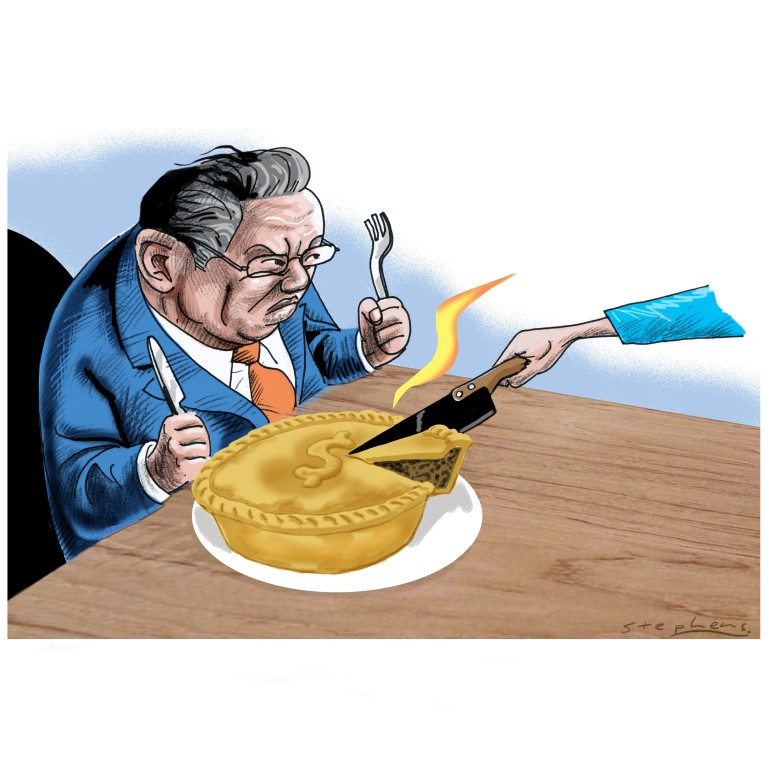
Hong Kong government must act to reverse harmful trend of wealth inequality
Kalina Tsang says higher taxes for Hong Kong's wealthy could help the government finance much-needed public services, and close the widening gap between rich and poor
With the Lunar New Year almost upon us, auspicious greetings of prosperity and overflowing wealth will be on many people's lips. These greetings, however, drip with irony for some against the backdrop of a great divide.
Despite the phenomenal economic growth in Asia over the past two decades, inequality is on the rise. Within the Asia-Pacific region, there are
roughly seven million millionaires, yet about 500 million people in Asia barely survive on US$1.25 a day.
Faulty tax systems are partly to blame as they allow businesses to hide their money in tax havens or take advantage of loopholes, depriving governments of resources to fight poverty and invest in public services that benefit people in need.
An estimated US$100 billion a year is lost in developing countries from tax-dodging and generous tax incentives. Bangladesh, for instance, loses US$310 million in would-be corporate taxes every year. Without a tax system that helps redistribute wealth more evenly, the cards are stacked against the poorer population.
One of the most developed economies in Asia, Hong Kong is no stranger to inequality. In 2011, the city's Gini coefficient stood at a striking 0.537, indicating much inequality in income distribution. It was estimated that Hong Kong's highest paid employee made around HK$180 million in 2013, or HK$15 million a month. Contrast this with someone being paid the minimum wage (now HK$32.50 an hour) - they would need to work non-stop for 52 years just to make what the highest-paid employee earns in a single month.
According to 2014 Credit Suisse figures, the wealth of Hong Kong's richest 10 per cent is equivalent to that of 77.5 per cent of the population.
This bears an uncanny resemblance to Oxfam's recent research paper, which warned that the combined wealth of the world's richest 1 per cent would overtake that of the other 99 per cent next year unless we address inequality.
Like other countries, it is the marginalised in our society that bear the brunt of this injustice. According to the Commission on Poverty's 2014 statistics, about 285,000 elderly people were living under the poverty line even though they were receiving various social security payments. Moreover, the poverty rate of this group was 30.5 per cent, notably higher than the overall rate of 14.5 per cent. Among poorer elderly people, women are especially vulnerable as they do not have any retirement protection. An estimated 20 per cent of working-age women, or 640,000 women, are homemakers who probably lack a formal retirement protection scheme - such as the Mandatory Provident Fund - to cater for their future needs. Women also face discrimination at work - they can be paid anywhere between 13 and 40 per cent less than men for the same work.
So what does this mean? French economist Thomas Piketty pointed out that letting a free market dictate without proper government monitoring will only leave wealth in the hands of a few. In fact, heavy emphasis on a free market has led to less public spending and more privatisation of public services in various countries. This, in effect, denies poorer citizens of basic services they're entitled to, like education. With social mobility hindered, intergenerational poverty continues, reducing the public's spending power and undermining economic growth. In some cases, this even leads to social instability.
Depressing? Perhaps. Irreversible? No.
US President Barack Obama's recently proposed tax hikes on the rich is a possible solution. By raising taxes on the rich and reducing taxes for the poorest, the government can raise revenue to finance public services.
An Oxfam report found that a levy of 1.5 per cent on the wealth of the world's billionaires, for instance, would raise enough each year to send all children to school and deliver health care to the poorest countries.
Locally, we believe a move like this would improve several areas. Increased revenue through tax reform could better protect those caring for their families full-time and retirees through an improved retirement scheme. It would also enable the government to ensure a better distribution of wealth and close the gap between the two extremes.
To address inequality, fair pay is a must. The government should ensure that the minimum wage allows workers and their families to afford a basic standard of living in Hong Kong. We have also pushed the private sector to take up corporate social responsibility to ensure fair wages and better labour conditions. Moreover, equal pay for the same work and equal treatment is essential to close the gender pay gap and realise true gender equality.
As we've seen, inequality is created through economic, social and political structures that keep poor people from the opportunities and resources to escape poverty and live fully. Wealth was never meant to trickle upwards into the hands of the few, yet this is what we're seeing.
Waiting for money to trickle down through a system that takes for granted "every man for himself" is impractical, if not absurd. Clearly, things can be done, but are we willing to choose to make a change so that prosperity for all is less of a distant dream?

